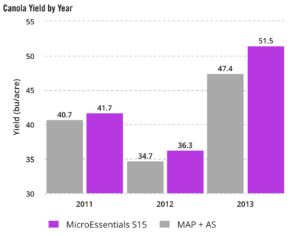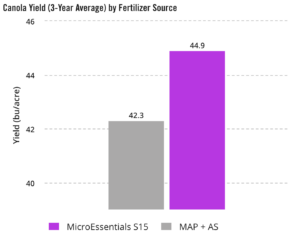OVERVIEW
- Proper applications of phosphorus (P) and sulfur (S) are critical for optimum canola yields.
- A blend of MAP + AS (ammonium sulfate) is commonly used as a primary fertilizer source in canola-growing regions of North America.
- MicroEssentials® S15® (13-33-0-15S) is a proprietary fertilizer that combines nitrogen (N), phosphorus (P) and sulfur (S) fused into one nutritionally balanced granule.
- Growing conditions in North Dakota and the Canadian Prairie Provinces varied greatly across 2011, 2012 and 2013.
TRIAL DETAILS
Years: 2011-2013
Crop: Canola (Brassica napus)
Data Source: Field studies conducted by third-party, independent researchers.
Experimental Design: Small-plot RCBD with 4 replications.
Cropping Conditions:: Trials conformed to local cropping practices.
P Rate: 33 lbs P₂O₅/ac
S Rate: 15 lbs S/ac
Application Timing and Method: Fertilizer was applied with the seed at planting.
RESULTS


SUMMARY
- In 2011, 2012 and 2013, MicroEssentials® S15® increased yield by 1.0 bu/ac, 1.6 bu/ac and 3.7 bu/ac, respectively.
- The 3.7 bu/ac (6.1%) yield advantage of MicroEssentials® S15® in 2013 demonstrates its superior performance under excellent growing conditions.
- The three-year average across 24 trials shows the statistically significant yield advantage of 2.6 bu/ac with MicroEssentials® S15® compared to MAP + AS. This data demonstrates the value of uniform nutrient distribution and season-long sulfur availability provided by MicroEssentials®.